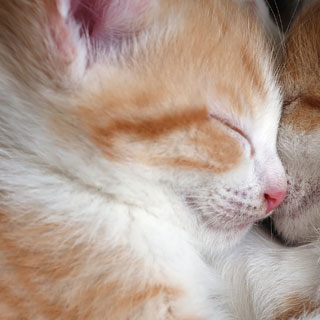|
|
By spaying or neutering your pet, you’ll help control the pet homelessness crisis, which results in millions of healthy dogs and cats being euthanized in the United States each year simply because there aren’t enough homes to go around. There are also medical and behavioral benefits to spaying (female pets) and neutering (male pets) your animals.
Here are some of the medical benefits:
- Your female pet will live a longer, healthier life. Spaying helps prevent uterine infections and breast tumors, which are malignant or cancerous in about 50 percent of dogs and 90 percent of cats. Spaying your pet before her first heat cycle offers the best protection from these diseases.
- Neutering your male companion prevents testicular cancer and some prostate problems.
And behavioral benefits:
- Your spayed female pet won't go into heat. While cycles can vary between dogs and cats, female cats usually go into heat four to five days every three weeks during breeding season while female dogs enter their heat cycle 1-3 times a year. In an effort to advertise for mates, they'll vocalize, become more anxious, and urinate more frequently—sometimes all over the house!
- Your male dog will be less likely to roam away from home. An intact male will do just about anything to find a mate, including finding creative ways escape from the house. Once he's free to roam, he risks injury in traffic and fights with other male animals.
- Your neutered male may be better behaved. Intact dogs and cats are more likely to mark their territory by spraying strong-smelling urine all over the house. Your dog might be less likely to mount other dogs, people and inanimate objects after he’s neutered. Some aggression problems may be avoided by early neutering.
|

|
Spaying/neutering your pets is also highly cost-effective. The cost of your pet's spay/neuter surgery is far less than the cost of having and caring for a litter.
Debunking Spay/Neuter Myths and Misconceptions
- Myth: Spaying or neutering will always cause your pet to become overweight.
Lack of exercise and overfeeding will absolutely cause your pet to pack on the extra pounds—not necessarily spaying/neutering. Some pets may experience a decrease in metabolism (15-25%). However, your pet will remain fit and trim as long as you continue to provide exercise and monitor their food intake.
- Myth: Neutering will quickly fix all behavior problems.
Although neutering your pet often reduces undesirable behaviors caused by a higher level of testosterone, there’s no guarantee that your pet’s behavior will change after he’s neutered. Although the surgery will reduce the amount of testosterone in your pet's system, it won’t eliminate the hormone completely. Neutering will also not reduce behaviors that your pet has learned or that have become habitual. The effects of neutering are largely dependent on your pet’s individual personality, physiology and history.
When to Spay or Neuter Your Pet
- For dogs and cats: While the recommended age for neutering/spaying is six to nine months, dogs and cats can be neutered/spayed as adults as well. There’s a slightly higher risk of post-operative complications in older, overweight and/or sick pets.
- For exotic pets: Same as dogs and cats. However, exotic pets such as rabbits, ferrets, guinea pigs and rodents can have higher risk of anesthesia because of different anatomy and physiology.
Helping Your Pet Before and After Surgery
|

|
In general, avoid giving your pet any food and water after midnight the night before surgery to prevent accidental vomiting and aspiration while under anesthesia.
Post-operative instructions and appropriate pain control will be provided. Depending on the procedure performed, medications for pain may vary.
|
Here are tips for a safe and comfortable recovery:
- Provide your pet with a quiet place to recover indoors and away from other pets.
- Prevent your pet from running and jumping for up to two weeks following surgery, or as recommended.
- Prevent your pet from licking the incision site by using an Elizabethan collar or a doughnut shaped e-collar.
- Avoid bathing your pet or wetting the surgical area for at least ten days after surgery.
- Check the incision site daily to confirm proper healing.
If you notice any redness, swelling or discharge at the surgery site, or if the incision is open, please contact us at (281)395-4700 or at cincoanimalhospital@gmail.com. Also let us know if your pet is lethargic, has a decreased appetite, is vomiting, has diarrhea or any other concerns following surgery.
|
